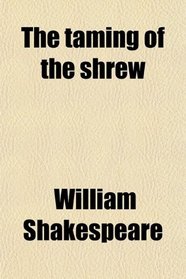Not only a really fun play with amazing dialog, but there are some great scenes that can be played out of context.
Search -
The taming of the shrew
The taming of the shrew
Author:
Purchase of this book includes free trial access to www.million-books.com where you can read more than a million books for free. This is an OCR edition with typos. Excerpt from book: THE TAMING OF THE SHREW INDUCTION SCENE I.—Before an Alehouse on a Heath. Enter HOSTESS and SLY. Sly. I 'll pheeze you, in faith. Host. A pair of sto... more »
Author:
Purchase of this book includes free trial access to www.million-books.com where you can read more than a million books for free. This is an OCR edition with typos. Excerpt from book: THE TAMING OF THE SHREW INDUCTION SCENE I.—Before an Alehouse on a Heath. Enter HOSTESS and SLY. Sly. I 'll pheeze you, in faith. Host. A pair of sto... more »
ISBN-13: 9780217641814
ISBN-10: 0217641814
Publication Date: 8/16/2009
Pages: 60
Rating: ?
ISBN-10: 0217641814
Publication Date: 8/16/2009
Pages: 60
Rating: ?
0 stars, based on 0 rating
Publisher: General Books LLC
Book Type: Paperback
Other Versions: Hardcover, Audio Cassette
Members Wishing: 0
Reviews: Member | Amazon | Write a Review
Book Type: Paperback
Other Versions: Hardcover, Audio Cassette
Members Wishing: 0
Reviews: Member | Amazon | Write a Review
Please Log in to Rate these Book Reviews
Genres:




